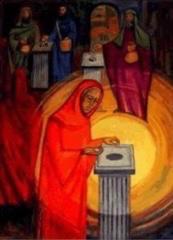Ahora tenemos que darle forma a lo que algun@s han comenzado a llamar; La Iglesia en Casa. Aunque yo me sigo preguntando; ¿qué hacen quienes no tienen un hogar? Por esto a la misma vez, estoy declarando desde hoy en nuestra Iglesia Santa Cruz una jornada de cuaresma de oración, ayuno y leer la Biblia en el Tiempo del Coronavirus.
Let's share what we have

Good morning, happy Saturday, and many blessings.
Remember that tomorrow Sunday we have our Community Mass in English and ASL at 10:00 by Zoom. Participates:
https://us02web.zoom.us/j/86977756635?pwd=R0ZzYUg0dWsrOFVFY3ljZWFpSUljdz09
Meeting ID: 869 7775 6635; Password: 839989.
Our biblical narrative for todays is in Mark 12:38-44. It is not difficult to observe that the scribes and Jesus were in tension throughout Mark’s Gospel. This tension was established right in the beginning of Mark’s story. A group of people classified Jesus’ teaching as possessing an “authority” the scribes they knew didn’t have (1:21). Oftentimes the scribes mistrusted Jesus’ various activities. In return, Jesus and his disciples questioned the influence of scribal teaching. At one point, the disciples, without Jesus’ around, argued with scribes over an ailing child (cf. 9:14). As his mission continued, Jesus recognized their antagonism, predicting that they would “reject” him (8:31) and, eventually, “condemn him to death” (10:33). So, Jesus’ public critique, in 12:38-40, fit into the larger pattern of conflict that Mark portrayed. Within this portrayal, the only exception to the theme was the one individual scribe who agreed with Jesus over the greatest commandment to love God and neighbor.
So, what now? The widow still gave! Is it possible to understand this story from her perspective? Even while Jesus may be critiquing the financial strains religious leaders and their institutions place upon the impoverished, this widow gave … out of a sense of obligation, perhaps. Perhaps, out of a sense of hope. In ancient Israel, the “poor” were not required to give; they simply did so because they believed in the goodness of the institution, the goodness of its leaders, and the need for the religious institution to remain. Perhaps she knew that once she gave it all, she would need to rely on the resources from the religious institution to provide for her. To care for the orphan and the widow, that kind of “pure religion,” as James would call it (cf. Mark 1:27) would hopefully touch the minds and hearts of her neighbors in her village when she was in her time of greatest need. And, perhaps Jesus knew that some of the scribes in charge would not carry out their end of the bargain. Yet, he also knew that there were some scribes, like the one in 12:28-34, who agreed with Jesus about the ultimate commands to love. And, perhaps, Jesus knew that this poor widow would be okay.
Now, to be honest, I don’t know what the widow was thinking when she put in her last two coins, nor do I know how she felt. But I do know, from my own experience, what it’s like to make an offering to God, and I’ve often heard others talk about what it meant to them.
The widow gave everything she had, and, in so doing, she laid claim to everything God had to offer. She became part of something greater than herself—the kingdom of God. As such, she walked away with something more than those who still had money in their pockets. Her devotion to God was the source of her strength and self-respect.
Just know this: When you do— when you give, not out of your abundance, but out of your living—God will bless you in ways far greater than you can never imagine; what’s more, you’ll have treasures in heaven.
Within our radical discipleship we must learn to share what we have. Here the issue is not giving what we have left over. Do you dare to share?
Blessings
Fr. Luis+
- Inicie sesión para comentar
